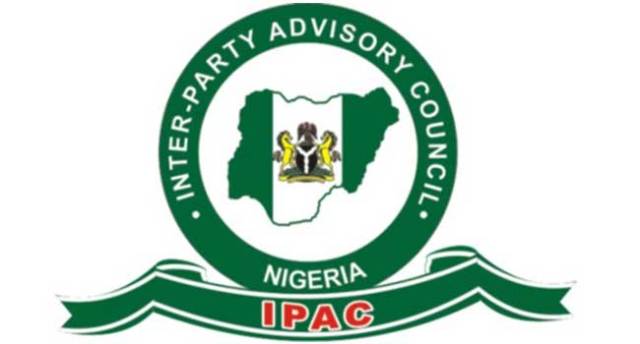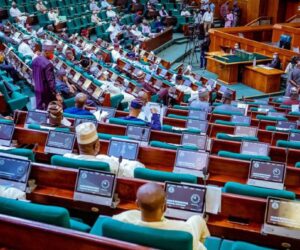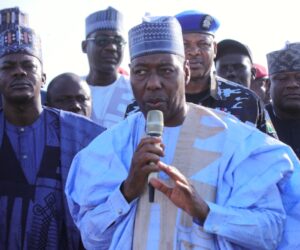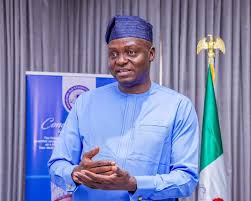Registered political parties in Nigeria, under the aegis of the Inter-Party Advisory Council (IPAC), have proposed the establishment of an independent body to appoint the Chairman of the Independent National Electoral Commission (INEC), its National Commissioners, and Secretary to ensure neutrality and strengthen Nigeria’s electoral integrity.
The proposal was made by IPAC National Chairman, Dr Yusuf Mamman Dantalle, on Monday during a consultative meeting between leaders of political parties and the House of Representatives Committee on Constitution Review held at the Wells Carlton Hotel and Apartments in Abuja.
Dantalle, who was represented by his deputy, Dipo Olayoku said the current system where the President appoints the INEC Chairman and other key officials compromises the commission’s independence and fuels public distrust.
SPONSOR AD
“To promote the independence of INEC, the power to appoint the Chairman, Secretary and National Commissioners should be removed from the executive.
“Instead, an Independent Appointment Committee (IAC) should be established, composed of representatives from all registered political parties, civil society organisations, the National Judicial Council, and a committee of the National Assembly drawn from both the majority and minority caucuses,” he said.
He said such an arrangement would ensure inclusivity, transparency, and credibility in the process of appointing the leadership of the nation’s electoral umpire.
Call for scrapping of SIECs
The IPAC Chairman while speaking on behalf of the parties, also called for the scrapping of State Independent Electoral Commissions (SIECs) and transferring the conduct of local government elections across Nigeria’s 774 local councils to INEC.
Dantalle said state electoral bodies have failed to inspire public confidence due to their consistent subservience to state governors, who often use them to entrench one-party dominance at the grassroots level.
“Politics is local, and citizens should be encouraged to participate in grassroots democracy that guarantees free, fair and credible local government elections.
“Vesting the conduct of council polls in INEC will restore credibility to the process and deepen local government autonomy,” he said.
In addition to the two key reforms, IPAC also proposed the restoration of public funding for political parties, arguing that it would create a level playing field and enhance multi-party participation in elections.
“Public funding for parties will strengthen democracy and promote inclusiveness, provided there are mechanisms to ensure transparency and accountability in financial management,” Dantalle explained.
The Council also expressed strong support for the establishment of an Electoral Offences Commission to prosecute election violators, noting that it would help reduce electoral crimes such as vote buying, ballot snatching, and result manipulation.
Dantalle further proposed that vacant legislative seats arising from death or defection should be filled by the original political party through a replacement process, rather than through fresh elections, which he described as “costly and avoidable.”
Dantalle commended the National Assembly, particularly the House Committee on Constitution Review, for engaging political stakeholders on key reform areas including judicial and electoral reforms, local government autonomy, special seats for women, state policing, and human rights.
“IPAC believes that a revised Constitution and Electoral Act, enacted ahead of the 2027 general election, will address recurring flaws, strengthen democratic governance, and ensure fair representation for all Nigerians,” he said.
He urged lawmakers to consider the proposals objectively, expressing optimism that Nigerians would finally get a constitution that reflects the will of the people.
“It is our hope that this constitutional review process will produce a people’s constitution that guarantees fairness, accountability, and a credible electoral system,” Dantalle concluded.
We must give women rightful place in governance – Kalu
Earlier, the Deputy Speaker of the House of Representatives and Chairman of the House Committee on Constitution Review, Hon. Benjamin Okezie Kalu, called for greater inclusion of women in governance, saying Nigeria’s democracy cannot attain its full potential without women having their rightful place at the decision-making table.
Kalu made the remark in his address during a consultative session with national chairmen, national secretaries, and national women leaders of all registered political parties.
Kalu said women who make up about half of Nigeria’s population remain “severely underrepresented” in political structures despite their immense contributions to national development.
“Too many Nigerians, especially women, still feel left behind. We must give women their rightful place in governance. Our democracy cannot be called complete when half of our population is excluded from making decisions that shape our collective destiny,” he said.
Kalu explained that one of the critical amendment bills before the House Committee on Constitution Review seeks to guarantee women’s representation in legislative houses, both at the federal and state levels.
According to him, the proposed reform is not a token gesture but a practical effort to ensure equity, inclusiveness, and justice within the nation’s democratic framework.
“No Nigerian should be excluded from decision-making because of gender. Women’s perspectives enrich policy, deepen democracy, and make governance more responsive,” he said.
He urged political parties to support the proposal, saying that genuine democratic progress depends on the active participation of women at all levels of leadership.
Beyond gender inclusion, Kalu outlined other key constitutional amendment areas the committee is pursuing including financial autonomy for local governments, streamlining the electoral process, and strengthening democratic institutions to make them more accountable and efficient.
“We want a Nigeria where local governments work, where elections are credible, and where our Constitution commands the respect of every citizen,” Kalu said.
He noted that the current constitutional review process is the most comprehensive and inclusive in Nigeria’s democratic history, with the committee consulting widely with civil society, traditional rulers, professional groups, security institutions, and stakeholders across the six geopolitical zones.
The Deputy Speaker emphasised that political parties remain the backbone of democracy and must play a leading role in shaping constitutional reforms that truly reflect the people’s will.
“Political parties are the bridge between government and the governed. You recruit candidates, mobilise voters, and articulate competing visions for Nigeria’s future.
“If constitutional amendments are to be legitimate, they must have your buy-in. If they are to endure, they must reflect a broad consensus that transcends party lines,” he said.
Kalu urged the party leaders to study the proposed amendment bills, consult their structures, and provide practical recommendations that would strengthen the reform process.
‘This is our moment to get it right’
Reflecting on Nigeria’s 26 years of democratic rule since 1999, Kalu said the country has made significant progress with seven successive general elections and peaceful transitions of power but must now confront deep structural weaknesses that have slowed democratic consolidation.
“Our democracy has survived on the goodwill of a few committed leaders, but goodwill alone is not enough. We need strong institutions, clear rules, and a Constitution that actively enables democracy,” he said
He called for collective responsibility in building a more inclusive and just society.
Akpabio: It’s time to renew the promise of our democracy
President of the Senate, Senator Godswill Akpabio, while declaring the event opened, called for a collective national commitment to “renew the promise of Nigeria’s democracy,” saying the ongoing constitutional review must deliver reforms that strengthen justice, inclusion, security, and accountability in governance.
Akpabio, who was represented by the Senate Whip, Mohammed Tahir Monguno, described the forum as “historic”.
He noted that credible elections and effective justice delivery were essential to restoring citizens’ faith in the system.
The Senate President endorsed local government autonomy, warning that governance that fails at the grassroots cannot succeed nationally.
“True federalism begins at the grassroots. If government does not work in the village, it has failed in the capital. We must free our local governments from the chains of dependency”, he said.
Akpabio also made a passionate case for women inclusion in governance, describing it as not only a moral obligation but an economic necessity.
“A democracy that sidelines its women weakens itself. Across the world, the evidence is clear; where women rise, nations thrive. It is time for Nigeria to move from the language of sympathy to the policy of inclusion,” he said.
He cited global examples of female leadership, noting that countries like Rwanda and Finland have demonstrated that when women participate fully in politics, national development accelerates.
Addressing the security challenges facing the country, Akpabio reiterated the need for state policing, describing it as “realism, not rebellion.”
Decentralisation of judiciary
In his contribution, the National Chairman of Accord, Maxwell Mbudem, adocated the decentralisation of the judiciary, proposing the establishment of state appeal courts to handle matters within the jurisdiction of states while federal appeal court handle federal matters.
He said this will ensure the judiciary is not overburdened and will also hasten the dispensation of justice.







